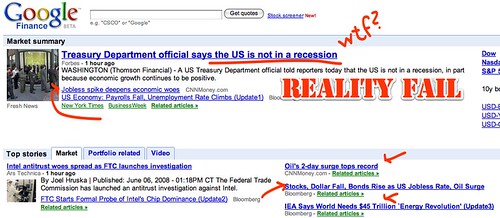The Online Marketer’s Web Strategy
 I had the privilege of attending and presenting at the MarketingProfs conference over the past two days, and it was a phenomenal conference, full of lots of good ideas. However, one thing stood out among the various discussions that I wanted to make a point about. There is a definite structure and strategy to online marketing that you need to follow to improve your likelihood of success.
I had the privilege of attending and presenting at the MarketingProfs conference over the past two days, and it was a phenomenal conference, full of lots of good ideas. However, one thing stood out among the various discussions that I wanted to make a point about. There is a definite structure and strategy to online marketing that you need to follow to improve your likelihood of success.
During a number of sessions, folks were talking about all the social media stuff available to marketers, about how to choose and how to get started. Social media was the buzzword at the conference.. Social media is sexy. Social media is the hot new thing.
Social media comes LAST, gang.
That’s right, last.
What comes first?
You first must have CONTENT. Something worth talking about. If you want to be in social media, the social part is conversation and discussion. If you have nothing worth talking about – and nothing worth others talking about you – then any effort you put into social media will largely be a waste of time.
Once you’ve got content, USER INTERFACE comes next. Make a web site that’s attractive, easy to navigate, easy to find stuff on. Hire a professional designer or information architect to help you with this if you’re not so good at it, or use a proven templating system. Whatever you do, focus on putting your content into an easily managed format that is a pleasure to use. Make sure you have at least one way of converting a visitor into a database entry somehow, whether it’s a simple mailing list, or a complex lead generation system.
If you’re marketing online, you’re marketing with a web site. Do your SEARCH ENGINE OPTIMIZATION next. Make sure your web sites validate with W3C standards, at least minimally. Make sure you optimize your sites, build some links, do all the basics. Check out Hubspot’s Web Site Grader for a great starter tool. When you set up profiles on other social networks, make sure you link back to your web site, always. SEO is all about capturing passive traffic, capturing people who are looking for your content.
Only after you’ve completed the steps of great content, user interface, and search engine optimization are you ready to dive into social media. There’s no way you can win the road race if your car is lacking tires and an engine. Content, UI, and SEO are the basics you MUST have in place prior to diving into social media, or else you’ll be wasting time, energy, and the limited slice of attention your audience is giving you – and they won’t give you again.
Photo credit: CC Chapman
Did you enjoy this blog post? If so, please subscribe right now!
Get this and other great articles from the source at www.ChristopherSPenn.com






 I got a hilariously off topic pitch from a PR firm today to the Financial Aid Podcast.
I got a hilariously off topic pitch from a PR firm today to the Financial Aid Podcast.

